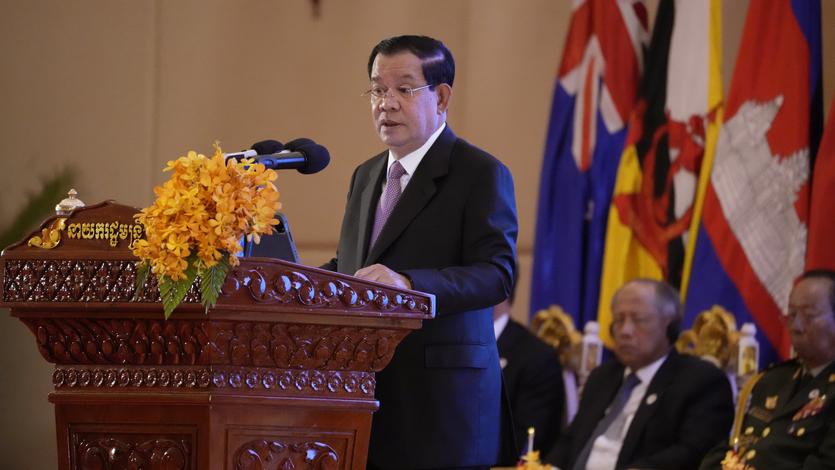 Cambodian Prime Minister Hun Sen delivers a speech during the ASEAN Defense Ministers' Meeting-Plus in Siem Reap, Cambodia, Nov 23, 2022. (PHOTO / AP)
Cambodian Prime Minister Hun Sen delivers a speech during the ASEAN Defense Ministers' Meeting-Plus in Siem Reap, Cambodia, Nov 23, 2022. (PHOTO / AP)
Cambodian Prime Minister Hun Sen’s current visit to China is another key milestone in bilateral ties, demonstrating the two countries’ longstanding and strong relations, experts say.
This visit by Hun Sen is important because this year marks the 65th anniversary of bilateral ties, and the Cambodia-China friendship year, said Chheang Vannarith, president of Phnom Penh-based think tank the Asian Vision Institute.
“(It is) the first foreign leader’s visit to China after Chinese New Year,” Chheang told China Daily, noting Hun Sen’s visit will open a new chapter in bilateral relations.
Leading a high-level delegation, Hun Sen arrived in China on Feb 9, in the afternoon, to begin a three-day official visit.
Noting that Cambodian PM Hun Sen’s visit speaks to the high quality of China-Cambodia relations, Chinese Foreign Ministry spokeswoman Mao Ning said on Feb 6 that Chinese leaders will meet and hold talks with him, for in-depth exchanges of views on bilateral relations and regional and international issues of common interest
Noting that Hun Sen’s visit speaks to the high quality of China-Cambodia relations, Chinese Foreign Ministry spokeswoman Mao Ning said on Feb 6 that Chinese leaders will meet and hold talks with him, for in-depth exchanges of views on bilateral relations and regional and international issues of common interest.
The visit to China will offer both governments an opportunity to advance their comprehensive strategic cooperative partnership and deepen the building of the China-Cambodia community with a shared future for the mutual benefit of the two peoples and nations, according to a post on Hun Sen’s official Facebook page on Feb 9.
ALSO READ: Cambodian Prime Minister Hun Sen to visit China
The timing of the visit is also important because it marks the third year since Hun Sen’s last visit to China in February 2020, when he was the first foreign leader to visit China following the COVID-19 outbreak, said Digby James Wren, a senior special adviser to and director of the Mekong Research Center, International Relations Institute, at the Royal Academy of Cambodia.
“Cambodia was able to handle (COVID-19) so well only because of Chinese assistance with the vaccines, medical care and equipment, and so forth,” Wren told China Daily.
Observing that China and Cambodia have described their friendship as an “ironclad brotherhood”, Wren said the two countries have built a very longstanding, strong and constructive relationship, with their cooperation penetrating various areas.
Chheang said he expects the signing of a series of new agreements during Hun Sen’s visit, in areas such as infrastructure cooperation, capacity building, tourism, science and technology, and agriculture.
As the China-Cambodia free trade agreement entered into force in 2022, Chheang said he hopes the two countries can further address technical issues in nontariff barriers and improve the market access of Cambodian agricultural products to China.
While some media reports have alleged a so-called “debt trap” in relation to Cambodia’s cooperation with China, Chheang said loans from China, the main donor and lender to Cambodia, are in a very stable and healthy condition.
The Cambodian Foreign Ministry denied on Feb 6 a report by Voice of America that Hun Sen scheduled the visit to China to seek tens of millions of dollars in loans and that this raised concerns over a “debt trap”.
“Despite having been given several explanations previously, the reporters of VOA intentionally ignored these clarifications and continued to play what is called dirty politics to undermine Cambodia-China relations,” The Phnom Penh Post quoted foreign ministry spokesman An Sokkhoeurn as saying.
READ MORE: Hun Sen: China's BRI greatly benefits Cambodia, other nations
Wren, from the Royal Academy of Cambodia, said the economy will remain the key focus in the bilateral cooperation between China and Cambodia and he sees great contribution from Chinese investment and technology to Cambodia’s development, with the country preparing to graduate from Least Developed Country, or LCD, status.
The next United Nations assessment of Cambodia’s exit from LCD status will be in 2024, and if the requirements are met, it will take effect in 2027, according to local media the Khmer Times.
Wren said China and Cambodia already set an example of building a community with a shared future, attracting attention from other countries.
Cambodia’s GDP growth remained at an average of 7 percent for nearly a decade before the pandemic, and Wren said it also became one of the first countries in the world to reach pre-COVID levels of GDP, which he said “could not have been done without China”.
Wren said he looks forward to seeing productive results from the relationship between China and Cambodia in areas including security, education, free trade and technology.
Contact the writer at kelly@chinadailyapac.com


